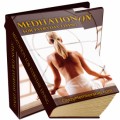Salespage Snapshot:

>>> Click Here To View Full Sales Page…
Table of Contents
INTRODUCTION
What is Meditation?
Types of Meditation
Top Ten Excuses Not to Meditate
Top Ten Reasons to Meditate
A Brief History of Meditation
Meditation in Hinduism
Meditation in Buddhism
Meditation in Christiaity
Meditation in Judaism
Meditation in Eastern Philosophy
Meditation in the Modern World
New Age Meditation
The Medical Benefits of Meditation
Getting Started
Meditation Tools You Should Have
Choosing a Meditation Space
10 Tips for Setting Up Your Meditation Space
Learning to Breathe
The Benefits of Deep Breathing
Tips to Help You Breathe More Effectively
Easy Meditation Breathing Exercises
10 Props That Can Help You Meditate
4 Easy Meditation Poses
1. Sukhasana
2. Vajarasana
3. Siddhasana
4. Padmasana
The Top 5 Most Common Mistakes That People Make When Starting a Regular Meditation Practice
Visualization and Meditation
Easy Visualization and Relaxation Techniques
Golden Light
Pictures from the Past
The Bridge
Meditation for Kids
The Benefits of Meditation for Kids
Tips for Meditating with Kids
10 Ways to Make Time to Meditate
Meditation Retreats
The Five Types of Meditation Retreats
1. Working Retreat
2. Guru Retreat
3. Spiritual Retreat
4. Spa Retreat
5. Personal Growth Retreat
Conclusion
Sample Content Preview
INTRODUCTION
When you’re very busy trying to juggle work, school, family obligations and other commitments finding the time to meditate is probably pretty low on your priority list. But if you make the time for some meaningful meditation every day you’ll feel better and you’ll be able to eliminate a lot of stress from you life. Even when it’s difficult to find the time to meditate the results that you’ll get from meditation are worth the effort. Health experts have recommended regular meditation sessions to busy people for years as a way to help manage stress and treat some of the many health problems that are associated with stress. Just a few minutes of meditation on a daily basis can greatly improve you health and greatly reduce your stress level.
Meditation is used for more than just stress reduction. In many cultures and in many religions meditation is used as a way to commune with the Divine and reflect on religious faith. Many religious leaders recommend regular meditation sessions for their followers in order to help them have a better understanding of their faith and what their role in the world is. In countries like India meditation is a routine practice and people often will attend temples or other places of worship to spend a few hours meditating at least once a week. For some religions meditation is seen as a type of prayer. Many Eastern religions and culture place a great value on the ability to meditate and let your conscious mind become quiet and still so that you can listen to your Inner Voice.
The hardest part about learning to meditate for people that come from Western cultures is learning how to be still. In this modern world people schedule their time very tightly and like to be doing something “productive” every moment of the day. Sometimes it takes a lot of effort for people that are not used to just being still to sit quietly or lie quietly and let their minds and bodies relax into meditation. It takes more discipline than you might think to train your mind and body to meditate but the benefits that come with regular mediation are enough to convince most people to put in the effort.
Along with reduced stress and stress-based illness if you start to meditate on a regular basis you will also find yourself staying calmer during the day, not reacting to the world in anger, having more faith in yourself and in your religious beliefs, and becoming more centered and more mindful of the world around you. The more you learn about meditation the more you’ll see that no matter how busy you are or how many other commitments you have making time for meditation is something that you need to do for yourself.
What is Meditation ?
Meditation is the act of quieting the mind and focusing inward. Meditation is used as a tool to increase creativity, find self-awareness, commune with the Divine, or just to relax. Meditation means many different things to different people, but in the end what is really important is what your meditation goal is. Meditation might be a historical part of your culture or your religion, it might be a way for you to unlock your creativity or increase your artistic productivity, or it might be something that your doctor recommended to help you deal with the stress of your hectic life. Meditation can do all of those things and more, depending on how rigorously you practice it.
Some people that really want to devote themselves to meditation or develop a regular meditation practice take classes in meditation, go on meditation retreats, set aside a special room in their home for meditation or in other ways make meditation a priority in their everyday lives. Other people just try to steal a few minutes to reflect quietly at the end of the day while they are soaking in a hot bath or saying their prayers at night. The only “right” meditation practice is the one that works for you so you should never hesitate to put your own spin on meditation and practice it in a way that works for you and your lifestyle even if it’s not like anyone else’s meditative practice.
Other Details- 30 Articles (TXT)
- 2 Ebook (PDF, RTF), 37 Pages
- 7 Part Autoresponder Email Messages (TXT)
- 1 Salespage (HTML, RTF)
- 3 Ecovers (JPG)
- File Size: 1,139 KB













